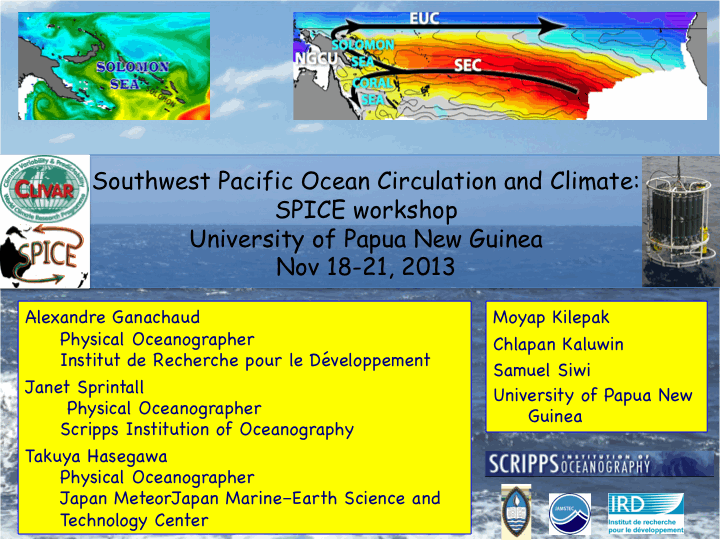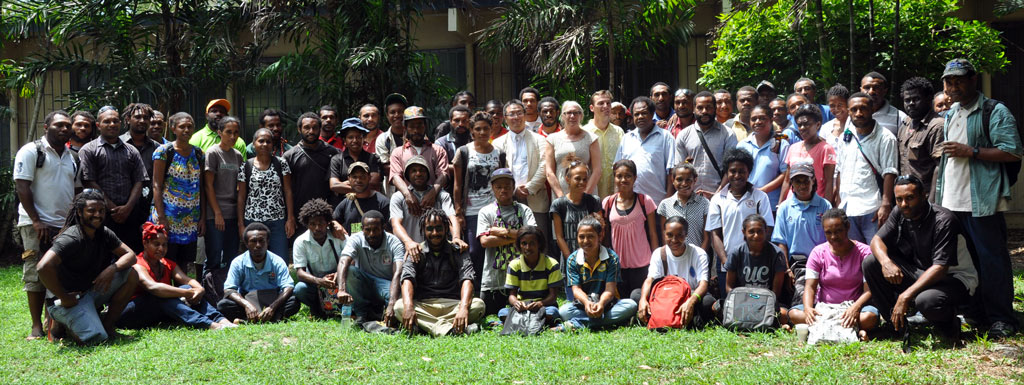
Workshop on the Southwest Pacific Ocean Circulation and Climate
Co-organization by
University of Papua New Guinea (UPNG)
Institut de Recherche pour le Développement (IRD)
Scripps Institution of Oceanography (SIO)
SCOPE
Waters from the South Pacific Ocean are transported toward the equator by strong currents, against the coasts of Australia and Papua-New Guinea. As a result, a very large amount of heat is carried in vigorous currents that cross the Solomon Sea, then influencing equatorial conditions—and climate. To better understand the description of these currents, their variations and representation in climate models, an international program was proposed by CLIVAR: the Southwest Pacific Ocean Circulation and Climate Experiment (SPICE). Three major cruises took place in and north of the Solomon Sea, and instrumented moorings are presently measuring key water transports. The purpose of this workshop is to communicate the ongoing research with UPNG students, faculty and decision makers and to set bases for common projects and training. The program includes data analysis for various scopes.
SCHEDULE
Monday (18 November 2013):
8:30 – 9:00: Welcome addresses, organization of the Workshop; roundtable
9:00 – 10:30: Lecture 1: Overview of the Southwest Pacific Ocean and Climate Experiment (SPICE): A. Ganachaud
10:30 – 11:00: morning tea
11:00 – 12:30: Practical 1*: Early results from Pandora and JAMSTEC cruises: simple analysis of the CTD/Argo profiles
12:30 – 13:30: lunch
13:30 – 14:45: Lecture 2: Dynamics of the ocean: wind-driven circulation, ENSO influence, Impact of a changing climate on the SW Pacific: A. Ganachaud / A. S. Gupta
14:45 – 15:15: afternoon tea; commemorative picture
15:15 – 17:00: Practical 2**: Analysis of Surface Currents and remotely sensed measurements of sea level in the Solomon Sea region.
Tuesday (19 November 2013):
9:00 – 10:00: Lecture 3: Oceanic pathways to the equator through the Solomon Sea: J. Sprintall
10:00 – 10:30: morning tea
10:30 – 12:00: Practical 3***: Fun with Argo floats.
12:00 – 13:00: lunch
13:00 – 17:00: Visit to Motupore Island Research Centre
Wednesday (20 November 2013):
8:30 – 9:30: Lecture 4: Warm pool variability and its relationship to ENSO: T. Hasegawa
9:30 – 10:00: Practical 4****: Time series analysis using TRITON buoy data and ENSO
10:00 – 10:30: morning tea
10:30 – 11:30: Practical 4****: (continued)
11:30 – 12:30: Lecture 5: Biogeochemistry in the Solomon Sea: A. Ganachaud for S. Bonnet and Lars-Eric Heimburger
12:30 – 13:30: lunch
13:30 – 15:00: Lecture 6: Ocean modelling: A. Ganachaud for J. Verron
15:00 – 15:30: afternoon tea
15:30 – 16:30: Lecture 7: Future plans of SPICE-related moorings and cruises
16:30 – 17:00: Wrap-up and closing of main workshop
Thursday (21 November 2013)
9:00 – 10:00: Round table Discussion: Collaboration opportunities for scientists and students
10:00 – 10:30: morning tea
10:30 – 12:30: Continued discussions; workshop report; implementation plans
12:30 – 13:30: end of the workshop and lunch
Organizing Committee
Mr. Moyap Kilepak, UPNG, mkilepak@upng.ac.pg
Prof. Chalapan Kaluwin, UPNG, ckaluwin@gmail.com
Dr. Alexandre Ganachaud, IRD, Alexandre.Ganachaud@ird.fr
Dr. Janet Sprintall, SIO, jsprintall@ucsd.edu
Dr. Takuya Hasegawa, JAMSTEC, takuyah@jamstec.go.jp
